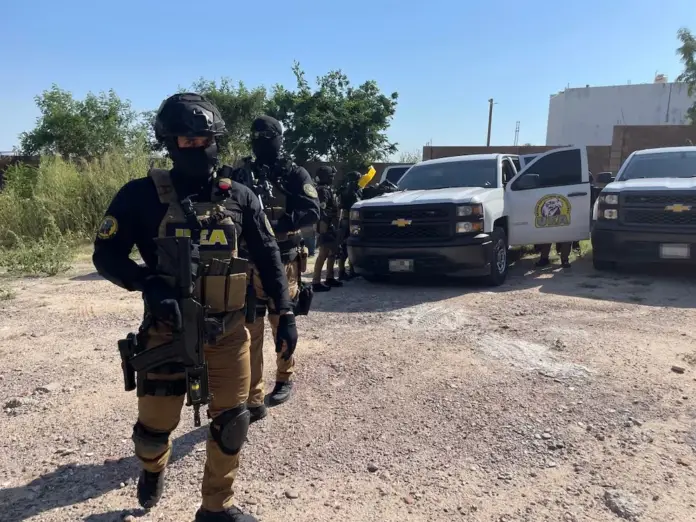The General Coordination of the State Council of Public Security (CESP) reported that, during the month that has passed of dispute between factions of the Sinaloa Cartel, in the state, there have been 192 intentional homicides, 224 forced disappearances and 200 displaced families in the south of the state.
In addition, it was indicated that 1,500 businesses have had to cut hours; 180 establishments have closed permanently and almost 2,000 formal jobs were lost last September.
“Far from predicting a quick conclusion to this conflict, as the days go by it is observed that public security, respect for human rights, productive activities, the economy and socio-emotional health are decomposing more and more. Little by little, day by day, people live in fear, schools are empty, young people are disappearing, the streets are empty at night,” explained Miguel Calderón, general coordinator of the CESP.
For her part, Laura Guzmán Torróntegui, vice president of the northern zone of the National Chamber of the Restaurant and Seasoned Food Industry (Canirac) described the situation in the state as a “hurricane that has not gone away” and that has left deep impacts on the local economy.
“We believe that it is not a political moment and it is not a moment of pointing fingers, it is a citizen moment, it is a moment to recover our streets, it is a moment to recover our commerce and it is a moment to have empathy,” she mentioned during her participation.
She commented that informal and street vendors have been the most affected, followed by restaurateurs and hoteliers, who have seen a dramatic drop in their income.
“(The situation) inhibits commerce and consumption from being generated in a timely manner. The city at 7:00 pm is like a ghost town and we cannot address the issue of entertainment, of recreation; for this reason, there is a difficult situation in the mental health of our culichis,” mentioned the vice president.
Proposals
Given this situation, a series of measures were proposed to the President of Mexico, Claudia Sheinbaum, to the Congress of the Union and to the governor of the entity, Rubén Rocha Moya, to address the situation, such as declaring an economic emergency that implements a soft loan program without Credit Bureau requirements, suspending the payment of taxes such as Income Tax; in addition to analyzing the granting of discounts and extensions of payment for electricity and drinking water.
They also demanded that priority be given to actions to disarm organized crime; the repair of damage to victims of crimes that have been committed in the last month, as well as the prompt and expeditious purge and implementation of the municipal police of Culiacán.
“If we do not act with anticipation and a will to change, we run the risk of the cycle of violence repeating itself indefinitely, but getting worse each time, which could be defined as the tragedy of prevention,” commented the general coordinator of CESP, Miguel Calderón.
Surveillance is reinforced
In the last eight days, that is, from the first day of Claudia Sheinbaum’s government (October 1) and until last October 8, according to data from state prosecutors and federal agencies, a total of 48 murders have occurred in Sinaloa.
This places it as the second entity with the most crimes of this type in the Mexican Republic in the indicated period; only Guanajuato, with 110 people murdered, surpasses the entity in number of deaths since Sheinbaum Pardo assumed the leadership of the federal Executive.
Governor Rubén Rocha Moya reported yesterday afternoon, October 9, through his social networks, that the Secretary of Security and Citizen Protection, Omar García Harfuch, and the Secretary of National Defense, Ricardo Trevilla, met with him.
“There was talk of the importance of continuing to coordinate and the commitment to have more National Guard personnel to protect schools, businesses and companies, mass events, as well as more special forces personnel,” explained the head of the state government.
Origin of the conflict
The violence in Sinaloa is linked to Ismael el Mayo Zambada, founder of the Sinaloa Cartel, who was arrested on July 5, along with Joaquín Guzmán López, son of Joaquín el Chapo Guzmán, in El Paso, Texas, by the United States authorities.
After this arrest, the leadership of the cartel was divided between Los Chapitos and the faction of Ismael Zambada, which has generated acts of violence in the state such as burning of vehicles, confrontations and other actions that have caused the suspension of activities in the state, such as public celebrations of September 15 throughout Sinaloa.
On September 22, Rocha Moya announced the arrival of two Army battalions, totaling 600 elements, to the state capital. According to what was explained, these troops would be integrated into the forces that already operated in the state, as part of a coordinated strategy between the three levels of government to confront the growing insecurity affecting Sinaloa.
Source: eleconomista






